Sherlock Holmes: A Game of Shadows
 for intense sequences of violence and action, and some drug material.
for intense sequences of violence and action, and some drug material.
Reviewed by: Raphael Vera
CONTRIBUTOR
| Moral Rating: | Better than Average |
| Moviemaking Quality: |
|
| Primary Audience: | Teens Adults |
| Genre: | Action Adventure Crime Mystery Thriller Comedy Drama Adaptation |
| Length: | 2 hr. 8 min. |
| Year of Release: | 2011 |
| USA Release: |
December 16, 2011 (wide—3,600+ theaters) DVD: June 12, 2012 |
| Featuring |
|---|
|
Rachel McAdams … Irene Adler Robert Downey Jr. … Sherlock Holmes Jude Law … Dr. John Watson Eddie Marsan … Inspector Lestrade Noomi Rapace … Sim Stephen Fry … Mycroft Holmes Jared Harris … Professor Moriarty Kelly Reilly … Mary Morstan Paul Anderson … Moran See all » |
| Director |
|
Guy Ritchie |
| Producer |
|
Warner Bros. Pictures Village Roadshow Pictures See all » |
| Distributor |
Prequel: “Sherlock Holmes” (2009)
An explosion in London is quickly ascribed to anarchists, but the inimitable detective Sherlock Holmes (Robert Downey Jr.) knows something more is afoot.
What appears as random acts of terror, he deduces are unquestionably linked to his greatest nemesis, the mysterious Professor James Moriarty (Jared Harris).
Agreeing to one last case on the night of his marriage is Dr. Watson (Jude Law) who, together with a clue supplied by Holmes” sometimes paramour and temptress/rival Irene Adler (Rachel McAdams) finds them hurtling inexorably towards a confrontation with the only man who may be Holmes” equal, as Moriarty schemes to plunge the world into war.
The duo will need to enlist the aid of a gypsy named Simza (Noomi Rapace), as clues take them from London, on board a train rigged to be a “wedding gift” death trap courtesy of Moriarty, to Paris and wherever else the trail leads them. But this time, as Moriarty might say, just who is the cat and who is the mouse?
Objectionable issues
Violence: Moderate. The violence is constant and not limited to explosions from a distance, but up-close knife wounds, poisonings, shootings, assassination and an extended torture scene with a type of grappling hook embedded in Sherlock’s shoulder. As with its 2009 predecessor “Sherlock Holmes”, there is an extended action scene shown in extreme slow motion, ala “The Matrix,” where you get to see people hurt amidst gunfire and explosions. Throughout all this, blood is kept to a minimum, and there is no gore. The camera does not overly dwell on these scenes and, thankfully, cuts away during a suicide.
Sex/Nudity: Mild to Moderate. Holmes takes Watson to a club where the entertainment includes a modest fan dance, while other women are on swings dressed in bulbous corsets and underwear, though, I must add, nothing overt is shown. So what pushed the film from “mild” to “moderate” really was the scene where Holmes” brother Mycroft (Stephen Fry) walks around in his castle nude. Though we only see him from the lower waist on up, Mary Watson is visibly uncomfortable. It is a non-sexual scene, obviously played for laughs, as it highlights the elder Holmes” eccentricity. Mycroft casually comments that he can see how Watson may appreciate someone of “her gender,” suggesting that he is either homosexual or entirely non-sexual. His obliviousness leaves this open for interpretation.
Language: Minor. Holmes makes several references that are more double entendrés than outright innuendos, such as Watson gaining weight “no doubt feasting on Mary’s muffins” and the strongest line delivered is when Holmes off handedly suggests Watson will have “…a good old fashioned romp, tonight.” During a battle scene, Holmes, poorly disguised as a woman, tells his friend, “Lie down with me, Watson” but one gets the feeling that he phrased this intentionally and is part of the friendly banter they share, and nothing more.
Watson shouts “Bast__ds” several times (Holmes once), and Mary says both “God” and “Oh my G__” during the same scene. At a gypsy camp, Holmes asks Watson not to dance “for God’s sake.” God’s name is never used in an intentionally profane manner.
Male/Female role modeling—The night club has waitresses dressed as men acting purposefully manlike and, though brief, this deserves mention.
Gambling and drunkenness is also prominently displayed at the night club, but neither is glorified.
Lessons
The partnership that Holmes and Watson enjoy is definitely more of a lifelong relationship than Watson would care to admit. The remnants of sibling rivalry that still shows between Holmes and his elder brother does not compare with what Sherlock has with Watson, giving life to the proverb:
“A man of many companions may come to ruin, but there is a friend who sticks closer than a brother” —Proverbs 18:24
Professor Moriarty is the consummate villain, manipulating everything to achieve his goals. His pride is shown early, when he has lunch with a victim who believes themself safe in a public restaurant, only to find that, at Moriarty’s command, everyone simply leaves, foretelling her impending doom.
What kind of “acute narcissist” (Holmes’ words) goes to all that trouble, just to impress someone, already consigned to die, of his power? Through the course of the film, we see that Moriarty has done everything on the list of things the Lord hates from Proverbs.
“There are six things the LORD hates, seven that are detestable to him: haughty eyes, a lying tongue, hands that shed innocent blood, a heart that devises wicked schemes, feet that are quick to rush into evil, a false witness who pours out lies and a man who stirs up dissension among brothers” —Proverbs 6:16-19.
Moriarty has convinced himself that he is only taking advantage of situations that would happen anyway and tries to dismiss it when he tells Holmes that, “You’re not fighting me, so much as you’re fighting the human condition.” This echoes precisely the message that the world feeds us daily, in so many different ways. How many times have we heard that “we can’t help ourselves”, “it’s just natural to _____” (fill in the blank) and excuse it for that very reason?
The Bible shows us time after time that God understands us better than we know ourselves, and that is why Jesus came, to offer us the only way out of our nature and to be heirs in Heaven. As the apostle Paul tells us:
“I know that nothing good lives in me, that is, in my sinful nature. For I have the desire to do what is good, but I cannot carry it out. For what I do is not the good I want to do; no, the evil I do not want to do-this I keep on doing” —Romans 7:18-19.
Paul later exclaims,
“What a wretched man I am. Who will rescue me from this body of death? Thanks be to God-through Jesus Christ our LORD!” —Romans 7:24-25.
One of the crucial differences between good and evil is in the way we live and die. The first martyr of the church was Stephen who, while being stoned to death was at peace and so much more than that.
“While they were stoning him, Stephen prayed, “Lord Jesus, receive my spirit.” Then he fell on his knees and cried out, “Lord do not hold this sin against them.” When he had said this, he fell asleep” —Acts 7:59-60.
Contrast this to the way evil violent men often meet their end, kicking and screaming. There are many deaths in this movie, but, I thought, one scene in particular exemplified this most profoundly and gave me, and I hope the audience, pause to consider.
One of the most talked about effects in the first “Sherlock Holmes movie (2009) was how Holmes would think out and plan a whole battle before it took place, and then it would happen, exactly as he planned it. This is again used very effectively in the sequel, to everyone’s enjoyment. Less featured in this film is the forensic science Detective Holmes employs in order to learn from clues. Perhaps director Guy Ritchie felt that a now established character, with investigative bona fides firmly in place, did not need the same painstaking detective work. However, as a longtime Sherlock Holmes fan, I sorely missed the “real-time” work. Easily half of his investigation takes place in flashback form, so they are not entirely absent, just recalled later, I suspect mainly for effect.
“Sherlock Holmes: A Game of Shadows” is a thrilling, thoroughly enjoyable action packed film, outstandingly scored by Hans Zimmer, that I enthusiastically recommend (with some cautions) and is sure to please audiences and keep the franchise going. Of course, the violence and the off-putting scene with Holmes” brother unfortunately merit keeping the kids away.
Violence: Moderate / Profanity: Minor / Sex/Nudity: Moderate
See list of Relevant Issues—questions-and-answers.


Overall, I enjoyed the movie.
Moral rating: Average / Moviemaking quality: 5
While Holmes relies on his brains over brawn, he does know how to handle himself. Also, as someone mentioned below, Professor Moriarty loses his menace in the movie because we see him too early. That I could give you, but I would also say that there are things that can’t be done on film that you can do in a book. And honestly, I’d say they played Holmes just as he is, but that’s just my opinion. In terms of morals, as I said, this movie was much better with the exception of Holmes” disguise and the sight of his brother walking around in the buff. But I would also say that it does offer some better morals. I mean Holmes is a cold, deducing machine, so it should be praised that he is willing to fight a man like Moriarty. When he claims that Holmes is only fighting human nature, as noted in the review, and Sherlock is willing to continue his battle, I’d say that says something.
As for his dressing as a woman, I’d say taken in context, it’s no more offensive than Bugs Bunny doing the same thing in all of his old cartoons. And as for Mycroft, he is, essentially, oblivious to the world, not to mention he’s described as a very lazy man. I’m sure he’d even be too lazy to dress since he never goes anywhere. All in all, I enjoyed this.
Moral rating: Better than Average / Moviemaking quality: 4½
Even I found the plot a little hard to follow, but I can only assume that was the director’s intention; to make you watch the film again and have you pay more attention so you can see things you may have missed the first time around. Biblically speaking, there’s nothing offensive, apart from the usual violence (which is mostly bloodless) and a brief scene of Holmes” older brother Mycroft walking around naked (though a shot of his posterior is visible for a few moments, nothing else is shown).
Some might think the scene of Holmes dressed as a woman is offensive, but I found it to be very much in keeping with the short stories and novels written by Sir Arthur in which Holmes dons various disguises. If you liked the first movie, you’ll love “Sherlock Holmes: A Game Of Shadows.”
Moral rating: Better than Average / Moviemaking quality: 5
Moral rating: Better than Average / Moviemaking quality: 4½
And most admirable to me was Holmes with great humor knew and took his enemy seriously, responsibly, diligently—doing everything of his part to quench and tear down every attempt and plot of harm and destruction. 1 Peter 5:8—Be alert, be on watch! Your enemy, the Devil, roams around like a roaring lion, looking for someone to devour. 1 John 3:8—For this purpose the Son of God was revealed, that He might undo the works of the Devil.
Moral rating: Average / Moviemaking quality: 5
Granted, there was the brief scene with a bit of the man’s buttocks showing. And obviously, this is not a kid’s movie—too intense and violent. But no “gross” or “disgusting” homosexual content. you’re way too sensitive if you’re offended by this movie. My advice would be, lighten up. There are far worse movies with objective trashy content to attack, and people should stop peeling their eyes for the slightest thing they can feel offended by.
Moral rating: Good / Moviemaking quality: 4½
My main complaint is that the first 1/3 of the movie is so slow in its plot, yet is filled with these fast action spots that are hard to keep up with. It gets better toward the halfway point. If you like this genre, you will like this movie. As a Christian, I didn’t take any offense from the movie. My wife and I both enjoyed it.
Moral rating: Better than Average / Moviemaking quality: 4½
Moral rating: Better than Average / Moviemaking quality: 4
Moral rating: Better than Average / Moviemaking quality: 3½
Moral rating: Average / Moviemaking quality: 3½
Moral rating: Average / Moviemaking quality: 3½
As for the comments regarding the film being suggestive of homosexuality, I did not notice anything of this nature that I can recall. It must have either been very mild, or maybe I missed some dialog going on. Overall, I really enjoyed the movie, and the reason I submitted “Neutral” rather than “Positive” is because of the mildly offensive themes.
Moral rating: Better than Average / Moviemaking quality: 4½
We won’t be buying this video or seeing any more Sherlock Holmes movies, no matter how enjoyable the humor is or how intelligent the plot is, for this reason. If we refuse to be entertained by promoters of sinful lifestyles, they may make better movies. If they don’t, at least we won’t fund their next morality degrading movie with our dollars.
Moral rating: Offensive / Moviemaking quality:
Moral rating: Offensive / Moviemaking quality: 5
For people who have not read the Holmes stories (and even if you have, really) you’ll be lost for much of the movie. Even if you are familiar with the Moriarty storyline that weaves through several Sherlock Holmes stories, this movie is still confusing. In the movie, they never even related any motivation for both the crimes and Holmes’ investigation of them.
As regards the negative comment about homosexuality in the movie, there is none. I really don’t know what that reviewer is even talking about. The reason some comments and dress are silly, and therefore funny, is *because* Holmes and Watson aren’t homosexuals (as is very clear in both movies). Men used to dress up as females a lot more in movies, when homosexuality wasn’t so blatantly rampant. It’s a shame that any return to that form is condemned as homosexual, rather than what such behavior has been deemed for years: silly.
Moral rating: Better than Average / Moviemaking quality: 5
…Overall, I thought this was a great movie for thirteen and above and if you haven’t seen it, please do.
Moral rating: Better than Average / Moviemaking quality: 5
Moral rating: Better than Average / Moviemaking quality: 4
Moral rating: Average / Moviemaking quality: 5
Moral rating: Excellent! / Moviemaking quality: 5
PLEASE share your observations and insights to be posted here.
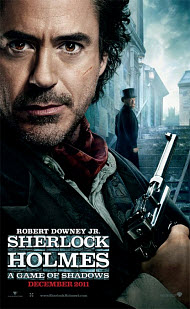

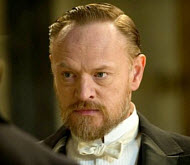
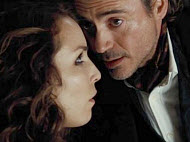
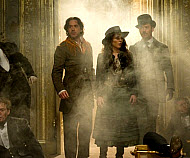
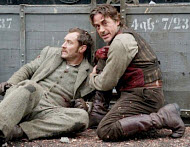
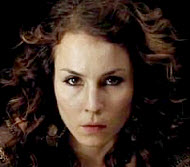
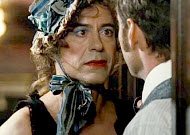
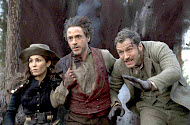
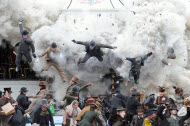
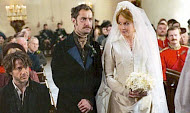
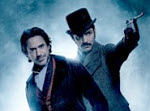

Although the climax is telegraphed early to Holmes fans, it in no way detracts from the enjoyment. Enjoy the brief scenes with Rachel McAdams, as the new leading lady’s name, and performance, are forgettable.
Although I am somewhat desensitized, I noticed nothing pornographic or profane, not even the increasingly common misuse of the Lord’s name. Despite being very sensitive to torture scenes, I found this one was brief and bearable. The frequent violence and death are accompanied by minimal blood and no gore.
From a Christian viewpoint, the film is simply a celebration of good over evil evil with a Satanic wisdom behind it. An appropriate quote might be 2nd Peter 2:11-12, where we are warned against laughing at the terrifying powers of the underworld (best translated in the Living Bible paraphrase).
My Ratings: Moral rating: Good / Moviemaking quality: 4½